|
|
|
Sort Order |
|
|
|
Items / Page
|
|
|
|
|
|
|
| Srl | Item |
| 1 |
ID:
127929
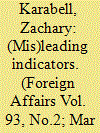

|
|
|
|
|
| Publication |
2014.
|
| Summary/Abstract |
Economic numbers have come to define our world. Individuals, organizations, and governments assess how they are doing based on what these numbers tell them. Economists and analysts loosely refer to statistics measuring GDP, unemployment, inflation, and trade deficits as "leading indicators" and subscribe to the belief that these figures accurately reflect reality and provide unique insights into the health of an economy. Taken together, leading indicators create a data map that people use to navigate their lives. That map, however, is showing signs of age. Understanding where the map came from should help explain why it has become less reliable than ever before.
|
|
|
|
|
|
|
|
|
|
|
|
|
|
|
|
| 2 |
ID:
127930


|
|
|
|
|
| Publication |
2014.
|
| Summary/Abstract |
Only five years ago, the world's supply of oil appeared to be peaking, and as conventional gas production declined in the United States, it seemed that the country would become dependent on costly natural gas imports. But in the years since, those predictions have proved spectacularly wrong. Global energy production has begun to shift away from traditional suppliers in Eurasia and the Middle East, as producers tap unconventional gas and oil resources around the world, from the waters of Australia, Brazil, Africa, and the Mediterranean to the oil sands of Alberta. The greatest revolution, however, has taken place in the United States, where producers have taken advantage of two newly viable technologies to unlock resources once deemed commercially infeasible: horizontal drilling, which allows wells to penetrate bands of shale deep underground, and hydraulic fracturing, or fracking, which uses the injection of high-pressure fluid to release gas and oil from rock formations.
|
|
|
|
|
|
|
|
|
|
|
|
|
|
|
|
| 3 |
ID:
127931


|
|
|
|
|
| Publication |
2014.
|
| Summary/Abstract |
In the early 1960s, Jalal Al-e Ahmad was one of Iran's leading literary celebrities, a writer whose works deeply impressed the dissident clerics who would go on to found and lead the Islamic Republic. Born to a devout family in Tehran in 1923, a boy in the bazaar, Al-e Ahmad had drifted away from the faith and eventually earned a degree in Persian literature. He flirted with the communist Tudeh Party of Iran in the 1940s but broke with it for being too pro-Soviet; then, he helped found (and later left) a workers' party that supported Mohammad Mosaddeq, who was elected prime minister of Iran in 1951. After the 1953 coup that toppled Mosaddeq, Al-e Ahmad succumbed to pressure from the shah's regime and renounced politics entirely, publishing a letter "repenting" for his prior participation. He returned to his roots and seemed to find his vocation, becoming famous throughout Iran as a novelist, essayist, and underground polemicist, especially for his 1962 book Gharbzadegi, or "West-struck-ness" (published in English as Occidentosis or sometimes Westoxification).
|
|
|
|
|
|
|
|
|
|
|
|
|
|
|
|
| 4 |
ID:
127926
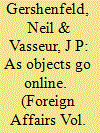

|
|
|
|
|
| Publication |
2014.
|
| Summary/Abstract |
Since 1969, when the first bit of data was transmitted over what would come to be known as the Internet, that global network has evolved from linking mainframe computers to connecting personal computers and now mobile devices. By 2010, the number of computers on the Internet had surpassed the number of people on earth.
|
|
|
|
|
|
|
|
|
|
|
|
|
|
|
|
| 5 |
ID:
127920
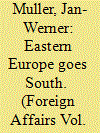

|
|
|
|
|
| Publication |
2014.
|
| Summary/Abstract |
Europeans love to celebrate anniversaries, especially those commemorating a terrible past overcome. This year will offer many such moments, marking as it will 100 years since the outbreak of World War I, 75 years since the beginning of World War II, and, most uplifting of all, a quarter century since the fall of the Berlin Wall. Such milestones are bound to make everyone feel good about European unity.
|
|
|
|
|
|
|
|
|
|
|
|
|
|
|
|
| 6 |
ID:
127924
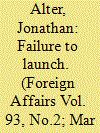

|
|
|
|
|
| Publication |
2014.
|
| Summary/Abstract |
President Barack Obama has often said that his proudest domestic achievement is the passage of the Patient Protection and Affordable Care Act (commonly known as the ACA or Obamacare). The sprawling law, pushed through Congress in 2010 in the face of fierce Republican resistance, made numerous important changes to the U.S. health-care system -- a system so big that, on its own, it represents an economy about the size of France's.
|
|
|
|
|
|
|
|
|
|
|
|
|
|
|
|
| 7 |
ID:
127921
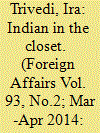

|
|
|
|
|
| Publication |
2014.
|
| Summary/Abstract |
On a bright January day, a group of around 200 lesbian, gay, bisexual, and transgender (LGBT) activists dressed in black, to symbolize mourning, gathered at Jantar Mantar, a site in New Delhi that frequently plays host to protests and demonstrations. Nearby, khaki-clad police officers warily observed the spectacle. The activists clutched rainbow flags to their chests and shouted slogans.
|
|
|
|
|
|
|
|
|
|
|
|
|
|
|
|
| 8 |
ID:
127925


|
|
|
|
|
| Publication |
2014.
|
| Summary/Abstract |
Late last October, the management expert Jeffrey Zients was given a mandate to fix HealthCare.gov, the website at the forefront of U.S. President Barack Obama's health-care reform, after its disastrous launch. Refusing to engage in happy talk about how well things were going or how soon everything would be fixed, Zients established performance metrics for the site's responsiveness, insisted on improvements to the underlying hardware, postponed work on nonessential features, demanded rapid reporting of significant problems, and took management oversight away from the Centers for Medicare and Medicaid Services (CMS, a federal agency within the Department of Health and Human Services) and gave it instead to a single contractor reporting to him. The result was a newly productive work environment that helped the website progress from grave dysfunction in early October to passable effectiveness two months later.
|
|
|
|
|
|
|
|
|
|
|
|
|
|
|
|
| 9 |
ID:
127919
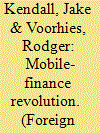

|
|
|
|
|
| Publication |
2014.
|
| Summary/Abstract |
The roughly 2.5 billion people in the world who live on less than $2 a day are not destined to remain in a state of chronic poverty. Every few years, somewhere between ten and 30 percent of the world's poorest households manage to escape poverty, typically by finding steady employment or through entrepreneurial activities such as growing a business or improving agricultural harvests. During that same period, however, roughly an equal number of households slip below the poverty line. Health-related emergencies are the most common cause, but there are many more: crop failures, livestock deaths, farming-equipment breakdowns, even wedding expenses.
|
|
|
|
|
|
|
|
|
|
|
|
|
|
|
|
| 10 |
ID:
127932
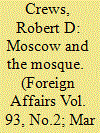

|
|
|
|
|
| Publication |
2014.
|
| Summary/Abstract |
If Russians were holding their breath in the run-up to the 2014 Winter Olympics, it was with good reason. A Black Sea spa town long favored by Kremlin apparatchiks, Sochi occupies a perilous position on Russia's southern frontier, just 50 miles west of the North Caucasus Federal District, a cauldron of ethnic strife, nationalist separatism, and state repression since the collapse of the Soviet Union. In the last two years alone, violence in this vast mountainous region, including car bombings, assassinations, and clashes between Muslim fighters and Russian security forces, has killed or injured more than 1,500 people.
|
|
|
|
|
|
|
|
|
|
|
|
|
|
|
|
| 11 |
ID:
127928
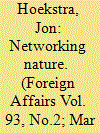

|
|
|
|
|
| Publication |
2014.
|
| Summary/Abstract |
Conservation is for the first time beginning to operate at the pace and on the scale necessary to keep up with, and even get ahead of, the planet's most intractable environmental challenges. New technologies have given conservationists abilities that would have seemed like super powers just a few years ago. We can now monitor entire ecosystems -- think of the Amazon rainforest -- in nearly real time, using remote sensors to map their three-dimensional structures; satellite communications to follow elusive creatures, such as the jaguar and the puma; and smartphones to report illegal logging.
|
|
|
|
|
|
|
|
|
|
|
|
|
|
|
|
| 12 |
ID:
127927


|
|
|
|
|
| Publication |
2014.
|
| Summary/Abstract |
During World War II, a top commander in what was then the U.S. Army Air Forces, General Henry "Hap" Arnold, developed a new way to attack U-boat stations and other heavily fortified German positions: he turned old B-17 and B-24 bombers into remotely piloted aircraft and loaded them with explosives. "If you can get mechanical machines to do this," Arnold wrote in a memo to his staff, "you are saving lives at the outset." The missions had a poor track record, but that did not deter Arnold from declaring in 1945 that "the next war may be fought by airplanes with no men in them at all."
|
|
|
|
|
|
|
|
|
|
|
|
|
|
|
|
| 13 |
ID:
127923
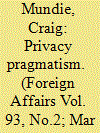

|
|
|
|
|
| Publication |
2014.
|
| Summary/Abstract |
Ever since the Internet became a mass social phenomenon in the 1990s, people have worried about its effects on their privacy. From time to time, a major scandal has erupted, focusing attention on those anxieties; last year's revelations concerning the U.S. National Security Agency's surveillance of electronic communications are only the most recent example. In most cases, the subsequent debate has been about who should be able to collect and store personal data and how they should be able to go about it. When people hear or read about the issue, they tend to worry about who has access to information about their health, their finances, their relationships, and their political activities.
|
|
|
|
|
|
|
|
|
|
|
|
|
|
|
|
|
|
|
|
|